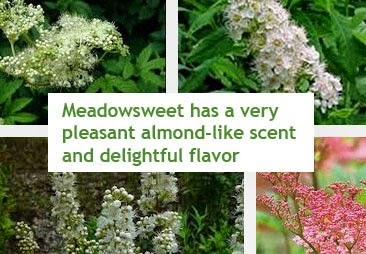You might be walking in the woods and come upon a swath of it in a low, wet meadow, sporting its fern-like leaves and clusters of dainty, creamy white, aromatic flowers. Would you realize that you're looking at a great source of headache and other pain relief? It might be Meadowsweet.
The scientific name is Filipendula ulmaria. Native to Europe and western Asia, it is now also found in North America where it has become naturalized. Other names for this lovely plant are Queen of the Meadow and Meadow Queen, Pride of the Meadow, Lady of the Meadow, Meadow Wort, Meadwort and Bridewort. It blooms from June through August or September.
Meadowsweet has a very pleasant almond-like scent and delightful flavor. Because of its strong, pleasant fragrance, it was strewn on floors with rushes and other greens to mask odors and placed around churches for weddings (thus Bridewort) and other special occasions. Queen Elizabeth I was especially fond of it for her chambers. It has long been used as a flavoring for wine and beer (like honeyed beer or mead, thus the name Meadwort), and in jams and preserved-fruit concoctions.
Meadowsweet - Natural Aspirin and So Much More
So what about pain relief?
Like slippery elm and willow bark, Meadowsweet contains salicylic acid, the main ingredient in aspirin. Salicylic acid has been known for hundreds of years for its ability to relieve pain and reduce fever. When Felix Hoffmann developed aspirin in 1897, he was looking for something to relieve his father's rheumatism.
As with other natural remedies, Meadowsweet can help with many different problems. Its pain-relieving properties can alleviate headaches, arthritis, rheumatism, and other aches and pains. Cold and flu symptoms and other respiratory troubles are lessened. Ulcer pain and heartburn can be settled. It is a proven diuretic. Meadowsweet also has bacteriostatic properties and can be used to fight infection and treat skin diseases.
The whole plant can be harvested and dried to make a natural remedy; usually as a tea or tincture. But be very careful that you are choosing the right plant! If you aren't skilled at making your own herbal remedies, Filipendula ulmaria is available in proven, safe doses in over-the-counter products.
So go out for a hike - it's good for you! Take an herbal guidebook with you, and you just might come upon an ancient remedy. And for the aches and pains from overdoing it the first time - look for herbal products containing Meadowsweet or Filipendula ulmaria.
WARNINGS:
The above article is for information only. Before using any product containing Meadowsweet you should consult your physician. You should not use this information instead of seeking the advice of a physician. Your symptoms can be a warning of an underlying condition that is more serious.
If you are sensitive to salicylates, sulfites or aspirin, or if you have asthma, you should not take this remedy. You should not take Meadowsweet if you are pregnant or may become pregnant. Side effects may include upset stomach.
There is no guarantee of the accuracy of this data. There is no clinical proof of the effectiveness of Meadowsweet for any of the above-mentioned symptoms.
(c) Debra Higgins, 2008
Find more articles about natural/alternative remedies at http://www.FourSeasonsVirtualAssistance.com
Article Source: http://EzineArticles.com/?expert=Debra_Higgins

No comments:
Post a Comment